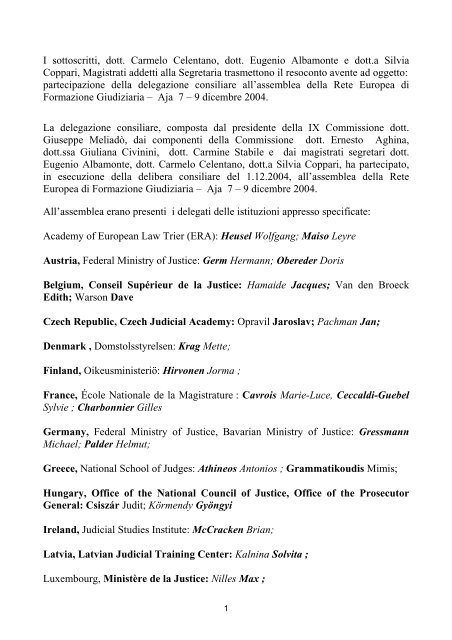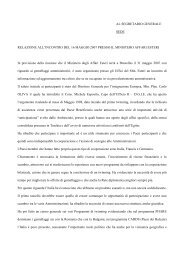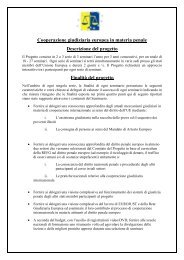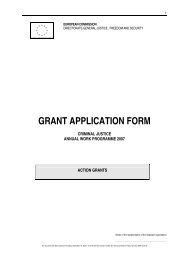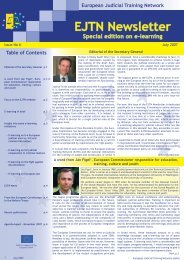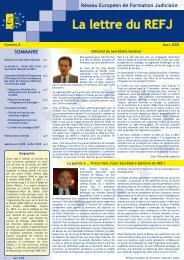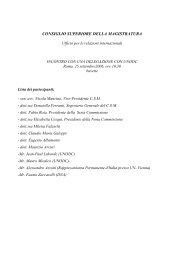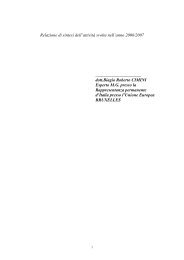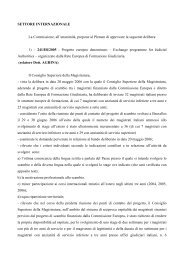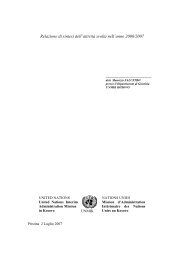I sottoscritti, dott. Carmelo Celentano, dott. Eugenio Albamonte e ...
I sottoscritti, dott. Carmelo Celentano, dott. Eugenio Albamonte e ...
I sottoscritti, dott. Carmelo Celentano, dott. Eugenio Albamonte e ...
Create successful ePaper yourself
Turn your PDF publications into a flip-book with our unique Google optimized e-Paper software.
I <strong>sottoscritti</strong>, <strong>dott</strong>. <strong>Carmelo</strong> <strong>Celentano</strong>, <strong>dott</strong>. <strong>Eugenio</strong> <strong>Albamonte</strong> e <strong>dott</strong>.a Silvia<br />
Coppari, Magistrati addetti alla Segretaria trasmettono il resoconto avente ad oggetto:<br />
partecipazione della delegazione consiliare all’assemblea della Rete Europea di<br />
Formazione Giudiziaria – Aja 7 – 9 dicembre 2004.<br />
La delegazione consiliare, composta dal presidente della IX Commissione <strong>dott</strong>.<br />
Giuseppe Meliadò, dai componenti della Commissione <strong>dott</strong>. Ernesto Aghina,<br />
<strong>dott</strong>.ssa Giuliana Civinini, <strong>dott</strong>. Carmine Stabile e dai magistrati segretari <strong>dott</strong>.<br />
<strong>Eugenio</strong> <strong>Albamonte</strong>, <strong>dott</strong>. <strong>Carmelo</strong> <strong>Celentano</strong>, <strong>dott</strong>.a Silvia Coppari, ha partecipato,<br />
in esecuzione della delibera consiliare del 1.12.2004, all’assemblea della Rete<br />
Europea di Formazione Giudiziaria – Aja 7 – 9 dicembre 2004.<br />
All’assemblea erano presenti i delegati delle istituzioni appresso specificate:<br />
Academy of European Law Trier (ERA): Heusel Wolfgang; Maiso Leyre<br />
Austria, Federal Ministry of Justice: Germ Hermann; Obereder Doris<br />
Belgium, Conseil Supérieur de la Justice: Hamaide Jacques; Van den Broeck<br />
Edith; Warson Dave<br />
Czech Republic, Czech Judicial Academy: Opravil Jaroslav; Pachman Jan;<br />
Denmark , Domstolsstyrelsen: Krag Mette;<br />
Finland, Oikeusministeriö: Hirvonen Jorma ;<br />
France, École Nationale de la Magistrature : Cavrois Marie-Luce, Ceccaldi-Guebel<br />
Sylvie ; Charbonnier Gilles<br />
Germany, Federal Ministry of Justice, Bavarian Ministry of Justice: Gressmann<br />
Michael; Palder Helmut;<br />
Greece, National School of Judges: Athineos Antonios ; Grammatikoudis Mimis;<br />
Hungary, Office of the National Council of Justice, Office of the Prosecutor<br />
General: Csiszár Judit; Körmendy Gyöngyi<br />
Ireland, Judicial Studies Institute: McCracken Brian;<br />
Latvia, Latvian Judicial Training Center: Kalnina Solvita ;<br />
Luxembourg, Ministère de la Justice: Nilles Max ;<br />
1
Malta, Judicial Studies Committee: Camilleri Joseph David;<br />
Netherlands, Stichting Studiecentrum Rechtspleging: De Jong Branda, Langbroek<br />
Martin, Quak Perry<br />
Poland, Ministry of Justice: Damasiewicz-Radwan Janina; Golik-Dobiszewska<br />
Elzbieta; Kujawa Inona<br />
Madurowicz Monika<br />
Portugal, Centro de Estudos Judiciários: Miranda Rodrigues Anabela, Rato João;<br />
Slovenia, Judicial Training Centre: Kmecl Andrej;<br />
Spain, Escuela Judicial del Consejo General del Poder Judicial, Centro de Estudios<br />
Jurídicos de la Administración de Justicia (CEJAJ): Azón Felix V., Salinas Molina<br />
Fernando, Dominguez Elena<br />
United Kingdom, England and Wales, Judicial Studies Board: Hall Victor<br />
Osservatori:<br />
Estonia, Office of the Prosecutor General: Sepp Raivo<br />
Segretariato:<br />
EJTN Secretary General: D’Alterio Armando<br />
EJTN Secretariat: Heusel Wolfgang, Maiso Leyre<br />
I lavori si sono svolti secondo l’agenda seguente:<br />
8 dicembre 2004<br />
1) Approvazione del resoconto dell’Assemblea Generale tenuta a Roma;<br />
2) Rapporto del Segretario Generale e del Segretariato;<br />
3) Esame delle modifiche statutarie proposte dal Comitato Direttivo e dibattito;<br />
9 dicembre 2004<br />
4) Ammissione dei nuovi Membri;<br />
5) Rapporti sulle attività svolte da ciascun gruppo di lavoro;<br />
6) Elezione degli organi del Network (in carica dal 14 marzo 2005);<br />
Nel corso dei lavori dell’Assemblea la delegazione italiana ha assunto, sui diversi<br />
argomenti all’ordine del giorno, le posizioni già deliberate dal Consiglio nella seduta<br />
del 1.12.2004 ed in particolare:<br />
2
a) per quanto attiene alle riforme statutarie relative agli organismi<br />
associativi le proposte avanzate dal comitato direttivo e raccolte in un<br />
documento riassuntivo redatto dalla Stichting Studiecentrum<br />
Rechtspleging olandese sostanzialmente prevedevano l’eliminazione del<br />
Segretariato quale organismo autonomo e la sua sostituzione con un<br />
ufficio di segreteria con compiti di collaborazione materiale alle attività<br />
del Segretario Generale; il rafforzamento dei poteri del Segretario<br />
Generale con particolare riguardo alla sua funzione di promozione del<br />
Network verso le istituzioni comunitarie e verso i paesi non<br />
appartenenti; il prolungamento della durata dell’incarico del Segretario<br />
Generale da due a tre anni e la sua elezione in base alla presentazione<br />
della candidatura congiuntamente ad un programma delle attività e delle<br />
finalità perseguite durante il mandato (all.to A).<br />
Durante il dibattito è stato convenuto che le modifiche da apportare<br />
avrebbero determinato l’aggiornamento dello statuto del Network e non<br />
la Carta Costitutiva dell’organizzazione. Tale documento conserverà il<br />
valore di un atto storico ma cesserà di avere natura di fonte di disciplina<br />
dell’associazione;<br />
b) quanto alla modifica statutaria dell’art. 8, volta ad introdurre un<br />
sistema di auto-finanziamento del Network da parte dei suoi membri, è<br />
stato calcolato che l’importo necessario per fronteggiare i costi<br />
dell’ufficio di segreteria e del Segretario Generale ammonta ad un totale<br />
di Euro 200.000. Tale somma è stata ritenuta idonea, in particolare, a<br />
coprire i costi relativi all’affitto di un ufficio, alla retribuzione di un<br />
impiegato ed una segretaria, a coprire le spese di viaggio del Segretario<br />
Generale.<br />
La proposta avanzata dal Comitato Direttivo era quella di raccogliere le<br />
somme necessarie alle attività del Network tramite contribuzione dei<br />
membri. L’importo della contribuzione richiesta ai membri era calcolato<br />
in ragione del pro<strong>dott</strong>o interno lordo di ciascun paese e previo<br />
determinazione della contribuzione minima in Euro 5.000 e della<br />
contribuzione massima in Euro 20.000. La delegazione italiana, in<br />
proposito, ha presentato alcuni emendamenti alle proposte di modifica<br />
avanzata dal Comitato Direttivo. In particolare è stato accolto<br />
dall’Assemblea l’emendamento volto ad attribuire all’Assemblea<br />
Generale e non al Comitato Direttivo, il potere di stabilire<br />
periodicamente l’entità della contribuzione a carico degli appartenenti.<br />
Tale emendamento era finalizzato a garantire la massima partecipazione<br />
al dibattito ed alle decisioni relative agli oneri economici a carico dei<br />
membri del Network.<br />
La modifica statutaria in esame (All.to B) è stata approvata con<br />
l’astensione della delegazione tedesca in ordine al § 1, che prevede<br />
l’obbligo di contribuzione e con l’astensione della delegazione spagnola<br />
3
in ordine al §. 3 che prevede che il finanziamento a carico dei Paesi con<br />
il PIL maggiore non potrà comunque eccedere i 20.000 Euro. La<br />
delegazione portoghese, invece, ha espresso riserve in ordine al fatto che<br />
il medesimo §. 3 non preveda l’entità del contributo minimo a carico dei<br />
Paesi con il PIL più basso.<br />
c) con riferimento alla contribuzione per l’anno 2005 sono state<br />
consultate le delegazioni presenti al fine di verificare se ciascun membro<br />
del Network fosse in grado di versare la somma richiesta in base alle<br />
modifiche statutarie a<strong>dott</strong>ate ed ai calcoli redatti con riferimento al PIL<br />
di ciascuna Nazione (All.to C). Hanno dichiarato di essere in grado di<br />
sostenere il contributo relativo al 2005 le delegazioni dei seguenti Paesi<br />
membri: Era, Austria, Belgio,Finlandia, Francia, Ungheria, Italia,<br />
Lussemburgo, Portogallo, Spagna, Regno Unito ed Olanda. Hanno<br />
invece espresso riserve le delegazioni di: Repubblica Ceca, Danimarca,<br />
Germania, Grecia, Irlanda, Lettonia, Malta, Polonia e Slovenia.<br />
In base ai calcoli effettuati e tenuto conto del limite di contribuzione<br />
massima approvato la contribuzione a carico del Consiglio Superiore<br />
della Magistratura, per l’anno 2005, è stata determinata in Euro<br />
20.000.<br />
Recependo un’indicazione espressa dal Comitato Direttivo, l’Assemblea<br />
Generale ha deliberato, inoltre, che i nuovi membri del Network,<br />
ammessi alla chiusura dei lavori, sarebbero stati esentati del pagamento<br />
del contributo per l’anno 2005.<br />
In esito alla discussione è stato, inoltre, approvato il regolamento che<br />
disciplina i tempi e le modalità del pagamento da parte dei membri<br />
(all.to D). Viene ivi previsto che le contribuzioni dovranno essere<br />
versate entro il 31 marzo 2005; che i membri i quali, per ragioni di<br />
bilancio, non potranno effettuare il versamento della quota entro il<br />
termine stabilito per l’anno 2005, saranno tenuti comunque a<br />
corrispondere la somma entro il 31 marzo 2006 unitamente a quanto<br />
dovuto , sempre a titolo di contribuzione, per l’anno 2006.<br />
In base ad emendamento proposto dalla delegazione italiana è stato,<br />
inoltre, previsto che le somme raccolte dal Network, tramite i suddetti<br />
conferimenti, verranno destinate, in primo luogo al pagamento delle<br />
spese necessarie alla costituzione della segreteria amministrativa (affitto<br />
dei locali e retribuzione dei dipendenti), mentre le spese ulteriori e<br />
diverse (quali ad esempio le spese sostenute dal Segretario Generale)<br />
verranno rimborsate dal Network solo nel caso e nei limiti di eventuali<br />
rimanenze di bilancio.<br />
4
Al fine di adempiere, con la maggior celerità possibile –tenuto anche conto della<br />
presentazione, da parte della Rete, della propria candidatura per l’ottenimento di un<br />
sovvenzionamento europeo nell’ambito del programma AGIS-, alle attività volte<br />
all’individuazione ed all’affitto dei locali destinati ad ufficio del Network ed<br />
all’assunzione del personale dipendente, l’Assemblea Generale ha deliberato la<br />
costituzione di un apposito gruppo di lavoro. Tale gruppo sarà composto dal<br />
Segretario Generale in carica Dr. A. D’Alterio, dal Dr. W. Heusel, rappresentante del<br />
Segretariato e dal Segretario Generale nominato all’esito dei lavori dell’assemblea.<br />
I lavori sono, quindi, proseguiti attraverso l’esame e l’approvazione delle modifiche<br />
al Regolamento del Network (All.to E). In tale ambito la delegazione dell’ERA ha<br />
proposto di inserire nel Regolamento un nuovo art. 9 che stabilisca regole puntuali<br />
per il finanziamento del Network e per la destinazione delle somme. La proposta<br />
dell’ERA è stata a<strong>dott</strong>ata dall’Assemblea Generale con alcuni emendamenti avanzati<br />
anche dalla delegazione italiana (All.to F)<br />
Per quanto attiene al rinnovo degli organi del Network l’Assemblea Generale ha<br />
nominato il Dr. G. Charbonnier, della Ecole Nazionale de la Magistrature, quale<br />
Segretario Generale.<br />
Quali componenti del Comitato Direttivo sono stati elette le istituzioni che<br />
rappresentano il Belgio, La Germania, l’Irlanda, l’Italia, l’Olanda, il Portogallo, la<br />
Spagna, l’inghilterra e Galles nonchè l’ERA.<br />
Per quanto attiene i Gruppi di Lavoro si è proceduto al rinnovo nel modo seguente:<br />
Gruppo Programmi: coordinatore del gruppo è stata eletta la Escuela Judicial della<br />
Magistratura spagnola; componenti del gruppo saranno: l’Ecole Nazionale de la<br />
Magistrature francese, il Consiglio Superiore della Magistratura, le istituzioni che<br />
rappresentano il Belgio, la Danimarca, la Finlandia, la Germania, la Grecia, la<br />
Lettonia, l’Olanda, nonché l’ERA.<br />
Gruppo Relazioni Esterne: coordinatore del gruppo è stato eletto il Centro de<br />
Estudos Judiciàrios portoghese; componenti del gruppo saranno il Consiglio<br />
Superiore della Magistratura, le istituzioni che rappresentano il Belgio, l’Austria, la<br />
Germania, Malta e la Spagna (CEJAJ).<br />
Gruppo “website”: coordinatore del gruppo è stato eletto il Consiglio Superiore<br />
della Magistratura; componenti del gruppo saranno le istituzioni che rappresentano la<br />
Francia, il Portogallo, la Spagna, l’Inghilterra e Galles.<br />
Revisori: sono stati nominati quali international auditors i Dottori H. German<br />
(Austria) e D. Mc Farland (Irlanda del Nord).<br />
5
In conclusione dei lavori L’Assemblea Generale ha a<strong>dott</strong>ato all’unanimità una<br />
risoluzione proposta dalla delegazione italiana con la quale viene dato mandato al<br />
Comitato Direttivo del Network di studiare le differenti opzioni tecnico-giuridiche al<br />
fine di favorire il riconoscimento dell’ EJTN da parte delle istituzioni comunitarie.<br />
6<br />
<strong>dott</strong>. <strong>Carmelo</strong> <strong>Celentano</strong><br />
Vice Segretario Generale<br />
<strong>dott</strong>. <strong>Eugenio</strong> <strong>Albamonte</strong><br />
Magistrato addetto alla Segretaria<br />
<strong>dott</strong>.a Silvia Coppari<br />
Magistrato addetto alla Segretaria
Modifiche apportate allo Statuto:<br />
Article Version proposed by the Steering<br />
Committee (proposed amendments in<br />
bold):<br />
9 The EJTN will consist of a General<br />
Assembly, a Steering Committee, and a<br />
Secretary General. (without Secretariat)<br />
10: (2) The Secretary General shall convene the<br />
Assembly by letter, fax, electronic mail or<br />
by any other suitable means of<br />
communication at least 30 days before the<br />
General Assembly. The convening<br />
documents shall include the agenda which<br />
shall be determined by the Steering<br />
Committee.<br />
10: (5) The General Assembly has the power to<br />
determine the policy and activities of the<br />
EJTN. It appoints the members of the<br />
Steering Committee (without the<br />
Secretariat) from the members of the<br />
EJTN. It also appoints the Secretary<br />
General in accordance with the<br />
provisions of these Articles of<br />
Association.<br />
10:(7) The Secretary General, the Steering<br />
Committee, (without the Secretariat) ad<br />
hoc Committees and Working Groups<br />
will report to the General Assembly. The<br />
General Assembly shall approve the<br />
budget and the accounts.<br />
11: (5) Proceedings and decisions of the<br />
General Assembly will be<br />
communicated to all members by<br />
the Secretary General.<br />
Decisions and the minutes adopted<br />
by the General Assembly shall be<br />
recorded in a register signed by the<br />
7<br />
(All.to A)<br />
Version adopted by the General<br />
Assembly (finally adopted amendments<br />
in red):<br />
The EJTN will consist of a General<br />
Assembly, a Steering Committee, and a<br />
Secretary General. [without Secretariat]<br />
The Secretary General shall convene<br />
the Assembly by letter, fax, electronic<br />
mail or by any other suitable means of<br />
communication at least 30 days before<br />
the General Assembly. The convening<br />
documents shall include the agenda<br />
which shall be determined by the<br />
Steering Committee.<br />
The General Assembly has the power to<br />
determine the policy and activities of the<br />
EJTN. It appoints the members of the<br />
Steering Committee [without the<br />
Secretariat] from the members of the<br />
EJTN. It also appoints the Secretary<br />
General in accordance with the<br />
provisions of these Articles of<br />
Association.<br />
The Secretary General, the Steering<br />
Committee, [without the Secretariat] ad<br />
hoc Committees and Working Groups<br />
will report to the General Assembly. The<br />
General Assembly shall approve the<br />
budget and the accounts.<br />
Proceedings and decisions of the<br />
General Assembly shall be<br />
communicated to all members by<br />
the Secretary General.<br />
Decisions and the minutes adopted by<br />
the General Assembly will be recorded<br />
in a register signed by the Secretary<br />
General and lodged with the secretariat.
Secretary General and lodged with<br />
the Secretary General’s<br />
secretariat. The Secretary<br />
General will make them available<br />
to members on request.<br />
11: (6) Needs being re-numbered to 11 (5): Article 11<br />
(6) is inaccurately numbered in the English<br />
version of Articles of Association.<br />
13: (1) The Steering Committee will consist of<br />
nine members. The General Assembly<br />
shall appoint for a term of office of three<br />
years the members of the Steering<br />
Committee from among the members of<br />
the EJTN.<br />
13: (3)<br />
New<br />
An EJTN member from the country of<br />
the Secretary General shall not be a<br />
member of the Steering Committee.<br />
14: (1) The Committee shall meet at the request<br />
of one or more members of the<br />
committee or at the request of the<br />
Secretary General and be convened by<br />
the Secretary General’s secretariat.<br />
15: (2) Decisions shall be recorded in a register<br />
signed by a member of the Steering<br />
Committee and lodged with the<br />
Secretary General’s secretariat. The<br />
Secretary General will make them<br />
available to members of the association<br />
on request.<br />
16.(1) The Secretary General will be appointed<br />
by the General Assembly for a period of<br />
three years on the basis of the<br />
candidate’s “plan of action”. At the<br />
conclusion of this term of office he will<br />
not be eligible for immediate<br />
reappointment and the General Assembly<br />
will then appoint a new Secretary<br />
General who is a citizen of a different<br />
Member State of the European Union<br />
and from a different member of the<br />
Network.<br />
16: (3) Major tasks and responsibilities of the<br />
Secretary General consist of:<br />
− the administration as<br />
8<br />
The Secretary General shall make them<br />
available to members on request.<br />
The Steering Committee will consist of a<br />
minimum of five members and<br />
maximum of nine members. The<br />
General Assembly shall appoint for a<br />
term of office of three years the<br />
members of the Steering Committee<br />
from among the members of the EJTN.<br />
Members from the country of the<br />
Secretary General shall not be<br />
members of the Steering Committee.<br />
The Committee shall meet at the request<br />
of one or more members of the<br />
committee or at the request of the<br />
Secretary General and be convened by<br />
the secretariat.<br />
Decisions will be recorded in a register<br />
signed by a member of the Steering<br />
Committee and lodged with the secretariat.<br />
The Secretary General shall make them<br />
available to members of the association on<br />
request.<br />
The Secretary General will be appointed<br />
by the General Assembly for a period of<br />
three years on the basis of the<br />
candidate’s “plan of action”. At the<br />
conclusion of this term of office he will<br />
not be eligible for immediate<br />
reappointment and the General Assembly<br />
will then appoint a new Secretary<br />
General who is a citizen of a different<br />
Member State of the European Union<br />
and from a different member of the<br />
Network.<br />
Major tasks and responsibilities of the<br />
Secretary General consist of:<br />
− the administration as
16: (7<br />
and 8)<br />
New<br />
administrative director of the<br />
secretariat and the network<br />
− the management of the finances of<br />
the network<br />
− the co-ordination and monitoring<br />
of EJTN activities<br />
− the management of the EJTN<br />
Website<br />
− the external representation of<br />
EJTN.<br />
7. The Steering Committee can,<br />
on the basis of at least three quarters<br />
of the votes cast, suspend the Secretary<br />
General during his tenure in the case<br />
of grave faults.<br />
8. The General Assembly shall<br />
ratify the Steering Committee<br />
proposal of discharge of the Secretary<br />
General on the basis of at least three<br />
quarters of the votes cast.<br />
17:(1) EJTN shall have a permanent<br />
secretariat functioning as<br />
administrative unit under the<br />
authority of the Secretary General.<br />
17: (2) The secretariat will be instructed by the<br />
Secretary General as to the administrative<br />
support to be provided in the coordination<br />
of the activities of the EJTN, the<br />
dissemination of information to members,<br />
and for practical support relevant to its<br />
activities.<br />
18: (2) Funding from the European Union, or given<br />
by the members for the purpose of financing<br />
the structure and administration of the EJTN,<br />
is to be used by the Secretary General; who<br />
will be accountable to the General<br />
Assembly.<br />
18: (4) Any funding from the European Union for<br />
training activities must, immediately on<br />
receipt by the Secretary General, be sent to<br />
the members concerned with the project for<br />
which the monies have been advanced. The<br />
members will be accountable to the<br />
Secretary General for the use to which such<br />
9<br />
administrative director of the<br />
secretariat and the network<br />
− the management of the finances of<br />
the network<br />
− the co-ordination and monitoring<br />
of EJTN activities<br />
− the external representation of<br />
EJTN.<br />
7. The Steering Committee may,<br />
on the basis of at least three quarters<br />
of the votes cast, suspend the Secretary<br />
General during his tenure and may<br />
propose to the General Assembly to<br />
discharge the Secretary General in the<br />
case of grave faults and may appoint<br />
an interim Secretary General.<br />
8. Following such a proposal, the<br />
General Assembly may discharge the<br />
Secretary General on the basis of at<br />
least three quarters of the votes cast.<br />
The EJTN shall have a permanent<br />
secretariat functioning as an<br />
administrative unit under the<br />
authority of the Secretary General.<br />
The secretariat will be instructed by<br />
the Secretary General as to the<br />
administrative support to be provided<br />
in the coordination of the activities of the<br />
EJTN, the dissemination of information<br />
to members, and for practical support<br />
relevant to its activities.<br />
Funding from the European Union, or given<br />
by the members for the purpose of financing<br />
the structure and administration of the EJTN,<br />
is to be used by the Secretary General; who<br />
will be accountable to the General<br />
Assembly.<br />
[this paragraph has been deleted]
monies have been put.<br />
18: (5) The Secretary General will draw up an<br />
annual budget plan for general running costs<br />
which is approved by the General Assembly<br />
for the following calendar year. The<br />
Secretary General has the duty to submit<br />
the previous year’s accounts to the General<br />
Assembly for approval.<br />
10<br />
The Secretary General will draw up an<br />
annual budget plan for general running costs<br />
which is approved by the General Assembly<br />
for the following calendar year. The<br />
Secretary General has the duty to submit<br />
the previous year’s accounts to the General<br />
Assembly for approval.
(All.to B)<br />
Testo dell’art. 8 dello Statuto approvato dall’Assemblea Generale:<br />
Article 8: Contributions<br />
1. Members shall pay an annual membership fee which will be used to cover the operational<br />
costs of the association. The annual membership fee shall be determined annually by the<br />
General Assembly, on a proposal from the Steering Committee, on the basis of the gross<br />
national income of the European Union Member State to which the member belongs and<br />
according to the association’s needs.<br />
2. For the members referred to in Article 7(1), second sentence, the fee is determined on the<br />
basis of the budget of the member concerned.<br />
3. The annual membership fee thus fixed may not exceed the sum of EUR 20.000<br />
per European Union Member State represented in the association.<br />
4. Further arrangements for fixing annual membership fees, their payment and collection can<br />
be laid down in a financial regulation adopted by the General Assembly on the proposal of the<br />
Steering Committee.<br />
11
(All.to C)<br />
Prospetto riepilogativo delle contribuzioni economiche richieste a ciascun<br />
membro del Network in esito alla modifica dell’art. 8 dello Statuto:<br />
EU Member State Members of the EJTN Membership fee 2005<br />
Austria Federal Ministry for Justice, Vienna 5.000,00 €<br />
Belgium Conseil Supérieur de la Justice, Brussels 6.000,00 €<br />
Czech Republic Judicial Academy, Straž pod Ralskem 2.000,00 €<br />
Denmark Domstolsstyrelsen, Copenhagen 4.000,00 €<br />
Finland Oikeusministeriö, Helsinki 3.000,00 €<br />
France Ecole Nationale de la Magistrature, Paris / Bordeaux 20.000,00 €<br />
Germany Federal Ministry of Justice, Berlin 20.000,00 €<br />
Greece Ecole Nationale de la Magistrature, Thessalonica 4.000,00 €<br />
Hungary<br />
- Office of the Prosecutor General, Budapest<br />
- National Council for the Judiciary, Budapest<br />
12<br />
2.000,00 €<br />
Ireland Judicial Studies Institute, Dublin 3.000,00 €<br />
Italy Consiglio Superiore della Magistratura, Rome 20.000,00 €<br />
Latvia Latvian Judicial Training Centre, Riga 1.000,00 €<br />
Lithuania Ministry of Justice, Vilnius 1.000,00 €<br />
Luxembourg Ministère de la Justice, Luxembourg 1.000,00 €<br />
Malta Judicial Studies Committee, Valetta 1.000,00 €<br />
Netherlands Stichting Studiecentrum Rechtspleging, Zutphen 10.000,00 €<br />
Poland Ministry of Justice, Warsaw 4.000,00 €<br />
Portugal Centro dos Estudos Judiciários, Lisbon 3.000,00 €<br />
Slovenia Judicial Training Centre, Ljubljana 1.000,00 €<br />
Spain<br />
- Consejo General del Poder Judicial, Barcelona<br />
- Ministry of Justice, Centro de Estudios Jurídicos de la<br />
Administración de Justicia (CEJAJ), Madrid<br />
16.000,00 €<br />
Sweden Domstolsverket, Jönköping 6.000,00 €<br />
United Kingdom<br />
- Judicial Studies Board for England and Wales, London<br />
- Judicial Studies Board for Northern Ireland, Belfast<br />
- Judicial Studies Committee for Scotland, Edinburgh<br />
20.000,00 €<br />
ERA 3.000,00 €
13<br />
(All.to D)<br />
Decision of the General Assembly of the European Judicial Training Network determining<br />
membership fees for the year 2005<br />
Considering article 8 of the Articles of Association, as modified by the General Assembly on 7<br />
December 2004;<br />
On the proposal of the Steering Committee;<br />
The General Assembly decides:<br />
Art. 1. The membership fees for the year 2005 are fixed as follows:<br />
(riproduce la tabella già illustrata all’All.to C)<br />
Art. 2. For members belonging to the same Member State of the European Union, the fee is divided<br />
as they see fit among the members concerned.<br />
Art. 3. The membership fee fixed according to the 1 st and 2 nd article of this decision must be paid at<br />
the latest by 31 March 2005.<br />
The members who, for budgetary reasons, are not able to pay the membership fee within the<br />
deadline fixed in the first paragraph, must pay the fee as soon as possible and in any case no later<br />
than 31 March 2006.<br />
Disputes concerning the application of the present article will be settled by the Steering Committee,<br />
after having heard the member concerned.<br />
Art. 4. The balance endowments obtained through the payment of the contributions from the<br />
partners will be destined, first of all, for the payment of the expenses for the constitution of the<br />
administrative secretariat. Other and different expenses will be covered only with the possible<br />
remaining balance.
Modifiche al Regolamento del Network:<br />
Article Version proposed by the Steering<br />
Committee (proposed amendments in<br />
bold):<br />
1: (1) These rules of procedure shall apply to<br />
all institutions of the EJTN, in particular<br />
to the General Assembly, the Secretary<br />
General, (without Secretariat) the<br />
Steering Committee, the Working<br />
Groups and any other body of the<br />
Network, and without prejudice to the<br />
Charter<br />
2: (2) Unless otherwise stipulated in the<br />
Articles of Association, a simple<br />
majority of the votes cast is sufficient for<br />
elections or decisions. Each member has<br />
one vote. No proxies are allowed.<br />
3: (1) The term of office shall be three years<br />
for the Steering Committee and for the<br />
Working Groups, both renewable. In as<br />
far as they are not elected members of<br />
the Steering Committee, those EJTN<br />
members representing EU Member<br />
States holding the previous, current or<br />
next Presidency of the European Union<br />
are explicitly invited to attend the<br />
meetings of the Steering Committee<br />
(without voting rights) during the<br />
relevant period.<br />
3: (2) The Steering Committee shall be<br />
convened by the Secretary-General or<br />
by the EJTN-member holding the<br />
presidency of the European Union at<br />
the request of any of the members of the<br />
Steering Committee. Meetings are<br />
hosted by a member appointed by the<br />
Committee or by the Secretariat. They<br />
are chaired by the member of the<br />
Committee hosting the meeting or by the<br />
EJTN-member holding the presidency<br />
of the European Union.<br />
3: (3) The General Assembly shall elect the<br />
Working Group Conveners on the<br />
14<br />
Version adopted by the General<br />
Assembly (finally adopted amendments<br />
in red):<br />
These rules of procedure shall apply to<br />
all institutions of the EJTN, in particular<br />
to the General Assembly, the Secretary<br />
General, [without Secretariat] the<br />
Steering Committee, the Working<br />
Groups and any other body of the<br />
Network, and without prejudice to the<br />
Charter<br />
Unless otherwise stipulated in the<br />
Articles of Association, a simple<br />
majority of the votes cast is sufficient for<br />
elections or decisions. Each member has<br />
one vote. No proxies are allowed.<br />
The term of office shall be three years<br />
for the Steering Committee and for the<br />
Working Groups, both renewable. In as<br />
far as they are not elected members of<br />
the Steering Committee, those EJTN<br />
members representing EU Member<br />
States holding the previous, current or<br />
next Presidency of the European Union<br />
are explicitly invited to attend the<br />
meetings of the Steering Committee<br />
(without voting rights) during the<br />
relevant period.<br />
The Steering Committee shall be<br />
convened by the Secretary-General or<br />
by the EJTN-member holding the<br />
presidency of the European Union at<br />
the request of any of the members of the<br />
Steering Committee. Meetings are<br />
hosted by a member appointed by the<br />
Committee or by the Secretariat. They<br />
are chaired by the member of the<br />
Committee hosting the meeting or by the<br />
EJTN member holding the presidency of<br />
the European Union.<br />
The General Assembly shall elect the<br />
Working Group Conveners on the<br />
(All.to E)
asis of the candidate’s “plan of<br />
action”. The convener shall coordinate<br />
the activities of the group. Meetings<br />
shall be held at the request of the<br />
Convener in co-ordination with the<br />
Secretary General or at the request of a<br />
majority of the members, at a place<br />
designated by the Convener. They shall<br />
be chaired by a representative of the<br />
Convener or by the Secretary General.<br />
4: (4) The Convener, the Hosting Member or<br />
the Secretary General can decide, after<br />
consultation and provided the members<br />
do not object, to invite representatives<br />
from other organisations to attend the<br />
meeting or to act as Rapporteur.<br />
6: (1) Minutes are to be kept for each meeting.<br />
The Secretary General is responsible for<br />
the minutes of Steering Committee<br />
meetings. Minutes of working group<br />
meetings are drafted by the Convener<br />
who may request assistance from the<br />
Secretary General.<br />
7 The Secretary General and, at their<br />
request, the Conveners of the working<br />
Groups shall report – orally and in<br />
writing – to the General Assembly on the<br />
activities of the Network and on the<br />
basis of their plans of action.<br />
8 Article 8 Secretary General<br />
(title)<br />
8: (1) The Secretary General shall assist the<br />
General Assembly, the Steering<br />
Committee and the Working Groups in<br />
their work. Him shall be given every<br />
support by all EJTN members. The<br />
Secretary General shall ensure the<br />
circulation to members of all necessary<br />
information, in particular that relating to<br />
the preparation and organisation of<br />
meetings. As far as possible this shall be<br />
done electronically.<br />
8: (2) The Secretary-General’s secretariat<br />
hosts and maintains the EJTN Website.<br />
The Secretary-General is responsible<br />
for the management of the EJTN<br />
15<br />
basis of the candidate’s “plan of<br />
action”. The convener shall coordinate<br />
the activities of the group. Meetings<br />
shall be held at the request of the<br />
Convener in co-ordination with the<br />
Secretary General or at the request of a<br />
majority of the members, at a place<br />
designated by the Convener. They shall<br />
be chaired by a representative of the<br />
Convener or by the Secretary General.<br />
The Convener, the Hosting Member or<br />
the Secretary General can decide, after<br />
consultation and provided the members<br />
do not object, to invite representatives<br />
from other organisations to attend the<br />
meeting or to act as Rapporteur.<br />
Minutes are to be kept for each meeting.<br />
The Secretary General is responsible for<br />
the minutes of Steering Committee<br />
meetings. Minutes of working group<br />
meetings are drafted by the Convener<br />
who may request assistance from the<br />
Secretary General.<br />
The Secretary General and, at their<br />
request, the Conveners of the working<br />
Groups shall report – orally and in<br />
writing – to the General Assembly on the<br />
activities of the Network and on the<br />
basis of their plans of action.<br />
Article 8 Secretary General<br />
The Secretary General shall assist the<br />
General Assembly, the Steering<br />
Committee and the Working Groups in<br />
their work. He/she shall be given every<br />
support by all EJTN members. The<br />
Secretary General shall ensure the<br />
circulation to members of all necessary<br />
information, in particular that relating to<br />
the preparation and organisation of<br />
meetings. As far as possible this shall be<br />
done electronically.<br />
The secretariat hosts and maintains the<br />
EJTN Website. The Secretary-General<br />
is responsible for the administration of<br />
the EJTN Website.
Website<br />
8: (3) The Secretary-General may appoint<br />
the permanent secretariat as a contact<br />
and information point for all EJTN<br />
members and for third parties.<br />
8: (4) The Secretary-General represents the<br />
Network vis-à-vis third parties. For other<br />
than routine business or in emergencies,<br />
he may only act with the authorisation of<br />
the General Assembly or the Steering<br />
Committee. (No change)<br />
8: (5) The Secretary-General shall coordinate<br />
the work of the Steering<br />
Committee and the Working Groups. He<br />
has the right to attend all meetings.<br />
8: (6)<br />
New<br />
8: (7)<br />
New<br />
The Secretary General will report on<br />
a regular, 6 month basis to the<br />
Steering Committee on the progress of<br />
his plan of action and of the Workings<br />
Groups.<br />
To the extent necessary the Secretary<br />
General will formally be released from<br />
his national institution’s duties in<br />
order to work for EJTN.<br />
16<br />
The secretariat acts under the<br />
authority of the Secretary General as a<br />
contact and information point for all<br />
EJTN members and for third parties.<br />
The Secretary-General represents the<br />
Network at an official level vis-à-vis<br />
third parties. For other than routine<br />
business or in emergencies, he may only<br />
act with the authorisation of the General<br />
Assembly or the Steering Committee.<br />
The Secretary-General shall coordinate<br />
the work of the Steering<br />
Committee and the Working Groups,<br />
having regard to the functions of the<br />
conveners. He/she has the right to<br />
attend all meetings.<br />
The Secretary General will report on<br />
a regular, 6 month basis to the<br />
Steering Committee on the progress of<br />
his plan of action and of the Workings<br />
Groups.<br />
Save as the General Assembly may<br />
otherwise determine, the Secretary<br />
General shall be employed for the<br />
EJTN on a full-time basis.
Modifiche all’art. 9 del Regolamento:<br />
Article 9 Draft proposed by ERA: Version adopted by the General<br />
new<br />
Assembly:<br />
9: (1) The accounts shall be administered The accounts shall be administered<br />
by the Secretary General who may by the Secretary General who may<br />
appoint an accountant in charge from appoint an accountant in charge from<br />
among the staff of the secretariat or among the staff of the secretariat or<br />
use external accounting services. use external accounting services.<br />
9: (2) Transactions within the framework<br />
of the budget approved by the<br />
General Assembly may be<br />
implemented by the Secretary<br />
General on his own responsibility.<br />
Other transactions require the<br />
approval of the Steering Committee if<br />
they exceed €2,500.<br />
9: (3) Funds received from the European<br />
Union for the general administration<br />
of the Network or for training<br />
activities shall only be forwarded to<br />
individual members on a pro rata<br />
basis and if sufficient evidence has<br />
been submitted to document the<br />
proportion of own contribution of<br />
direct costs to be covered by<br />
members. Final payments will be<br />
made only on presentation of original<br />
invoices and evidence documenting<br />
the proportion of own contribution<br />
and once the Commission has<br />
accepted the final reports. Members<br />
must send these documents as soon as<br />
possible to the Secretariat.<br />
9: (4) Quarterly status reports of the<br />
accounts are to be sent to the<br />
members of the Steering Committee.<br />
9: (5) The General Assembly shall elect two<br />
internal auditors to audit the<br />
administration of the accounts of the<br />
Network within six months after the<br />
end of the business year. The auditors<br />
shall report to the General Assembly<br />
in its meeting of the year following<br />
17<br />
Transactions within the framework<br />
of the budget approved by the<br />
General Assembly may be<br />
implemented by the Secretary<br />
General on his own responsibility.<br />
Other transactions require the<br />
approval of the Steering Committee if<br />
they exceed €2,500.<br />
Funds received from the European<br />
Union for the general administration<br />
of the Network or for training<br />
activities shall only be forwarded to<br />
individual members on a pro rata<br />
basis and if sufficient evidence has<br />
been submitted to document the<br />
proportion of own contribution of<br />
direct costs to be covered by<br />
members. Final payments will be<br />
made only on presentation of original<br />
invoices and evidence documenting<br />
the proportion of own contribution<br />
and once the Commission has<br />
accepted the final reports. Members<br />
must send these documents as soon as<br />
possible to the Secretariat.<br />
Half yearly status reports of the<br />
accounts are to be sent to the<br />
members of the Steering Committee.<br />
The General Assembly shall elect two<br />
internal auditors to audit the<br />
administration of the accounts of the<br />
Network within six months after the<br />
end of the business year. The auditors<br />
shall report to the General Assembly<br />
in its meeting of the year following<br />
(All.to F)
the respective business year. The<br />
term of office of each auditor shall be<br />
three years.<br />
9: (6) For each business year the Secretary<br />
General will also submit the report of<br />
an external auditor to the General<br />
Assembly. The external auditor may<br />
be reappointed not more than twice.”<br />
18<br />
the respective business year. The<br />
term of office of each auditor shall be<br />
three years.<br />
For each business year the Secretary<br />
General will also submit the report of<br />
an external auditor to the General<br />
Assembly. The external auditor may<br />
be reappointed not more than twice.<br />
9: (7) No later than one month prior to the<br />
General Assembly, the Secretary<br />
General shall send draft accounts to<br />
the members of the EJTN and shall<br />
formally present them to the General<br />
Assembly for debate.
EU Member<br />
State<br />
EUROPEAN JUDICIAL TRAINING NETWORK<br />
RESEAU EUROPEEN DE FORMATION JUDICIAIRE<br />
Members of the EJTN<br />
19<br />
Membership<br />
fee 2005<br />
Received<br />
Austria Federal Ministry for Justice 5.000,00 € 04.03.2005<br />
Belgium Conseil Supérieur de la Justice 6.000,00 € 10.03.2005<br />
Czech Rep. Judicial Academy 2.000,00 €<br />
Denmark Domstolsstyrelsen 4.000,00 €<br />
Finland Oikeusministeriö 3.000,00 €<br />
France Ecole Nationale de la Magistrature 20.000,00 €<br />
Germany Federal Ministry of Justice 20.000,00 €<br />
Greece Ecole Nationale de la Magistrature 4.000,00 €<br />
Hungary<br />
Non-availability<br />
declaration received<br />
Office of the Prosecutor General 1.000,00 € 17.02.2005<br />
National Council for the Judiciary 1.000,00 €<br />
Ireland Judicial Studies Institute 3.000,00 €<br />
Italy Consiglio Superiore della Magistratura 20.000,00 €<br />
Latvia Latvian Judicial Training Centre 1.000,00 € 14.02.2005<br />
Lithuania Ministry of Justice 1.000,00 €<br />
Luxembourg Ministère de la Justice 1.000,00 € 28.02.2005<br />
Malta Judicial Studies Committee 1.000,00 €<br />
Netherlands SSR 10.000,00 €<br />
Poland Ministry of Justice 4.000,00 €<br />
Portugal Centro dos Estudos Judiciários 3.000,00 €<br />
Slovenia Judicial Training Centre 1.000,00 €<br />
Spain Consejo General del Poder Judicial 8.000,00€<br />
Non-availability<br />
declaration received<br />
(All. G)
Centro de Estudios Jurídicos de la<br />
Administración de Justicia (CEJAJ)<br />
20<br />
8.000,00€ 09.03.2005<br />
Sweden Domstolsverket, 6.000,00 € 28.02.2005<br />
United<br />
Kingdom<br />
- Judicial Studies Board for E&W<br />
- Judicial Studies Board for N. Ireland<br />
- Judicial Studies Committee Scotland<br />
20.000,00 € 17.02.2005<br />
ERA ERA 3.000,00 € 01.02.2005


